Body image issues have become so widespread in society that more than half the population experience negative feelings about their body.
It’s the reason why the diet industry has grown to over $70 billion a year ($500 billion for the beauty industry), and people continue to engage in diet culture behaviors in an effort to feel better about their bodies.
The effects of a negative body image can reach into nearly every part of our lives. It can…
- create disordered eating patterns
- force you into doing exercise you hate
- keep you from wearing the clothes you want to wear
- ruin close relationships and prevent intimacy
- keep you from meeting new people or seeing old friends
- hold you back from going places or taking vacations
- create depressive and anxious thoughts
- keep you from making advances in your career
- prevent you from taking chances in your life
- negatively impact your entire life experience!
So to help you improve your body image I’m going to show you 10 different strategies we use with our clients to help them go from hating their body, to feeling confident in their own skin and getting their life back.
Let’s get started…
1. Change Your Views of The Ideal Body
When you hear the word “Ideal Body” what do you picture?
If you’re like most people, you picture the societal ideal. That’s the body 99% of all people are trying to achieve when they diet. However, it’s also the body that 99% of those same people will fail to achieve, yet will spend their entire life pursing it.
The only reason this body is ideal is because we as a society have been collectively conditioned to believe it’s the holy grail of body shape and size.
Ironically, this societal ideal is created by people who are also stuck in diet culture and have their own negative body image issues.
What’s even more interesting is how society’s version of the ideal body has changed over time.
There were actually times in history where bigger bodies were the ideal body. It was a sign of health and wealth.
But that’s besides the point. The ideal body shouldn’t be dictated by society – it should be determined by you.
There is not one ideal body – there are billions. The ideal body is unique to the person and is simply the body they are in when they have healed their relationships with food, body, exercise, and mind.
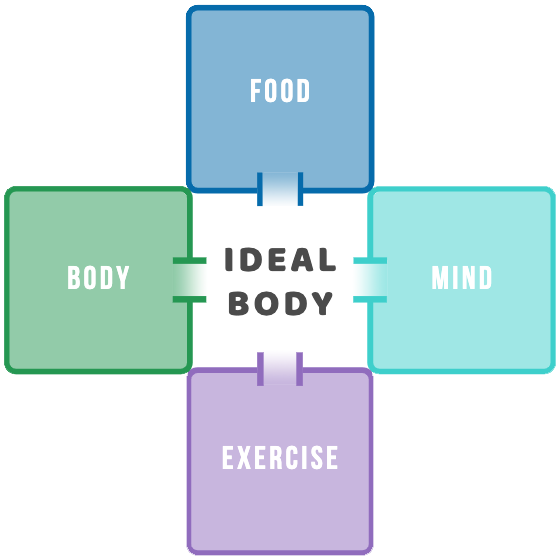
We call this the NEW Ideal Body. It’s not a what – it’s a when. It’s the body you’re in when you have healed those 4 relationships and are living your full life experience as a result.
Your first step to improving your body image is to reject societal beauty norms and start adopting a more empowering version of the ideal body.
2. Separate Your Body From Your Body Image
Your body and your body image are not the same thing. But for most people who have body image issues, they are so closely intertwined that they might as well be synonyms for each other.
When they are one-in-the-same, your body image becomes 100% dependent on what your physical body looks like.
That means if your body doesn’t align with the societal ideal, you’re going to have a bad body image. And the only way for you to improve your body image will be to change your body.
Since most people are utilizing diets with horrible success rates in an effort to lose weight, it makes perfect sense why so many people struggle with their body image. Failed diets = poor body image.
To improve your body image you have to separate your body from it. You have to make them two separate entities and work on them independently.
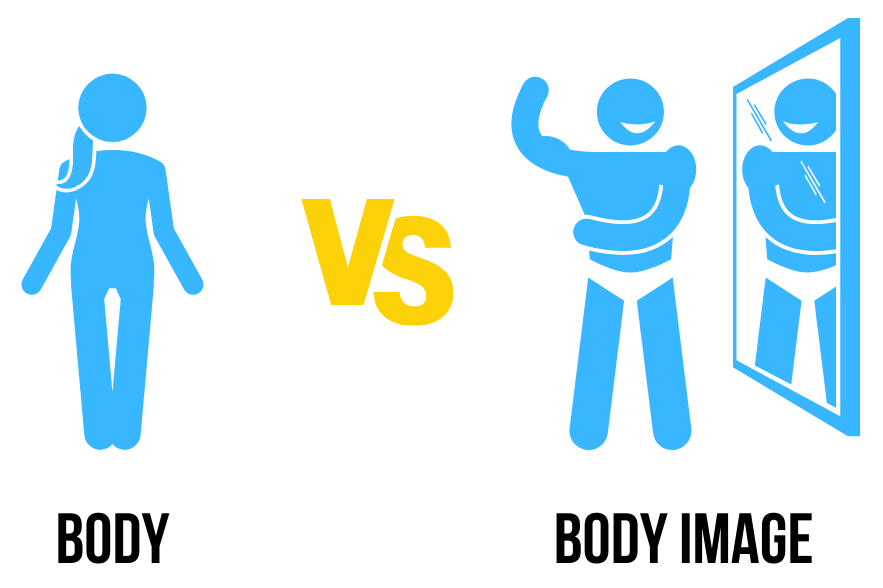
Your body is your physical body. It is fact. If you weigh 200lbs then you weigh 200lbs. There is no emotion attached to it. It just is what it is.
Your body image, on the other hand, is how you perceive your physical body. It is subjective and influenced by the beliefs of society and the experiences you’ve had in your life.
The good news is that since most of the pain associated with our bodies is the result of our negative body image, and body image is perception, we can begin to feel better about our bodies right this minute without ever losing a single pound.
3. Diversify Your Self-Worth
Society has conditioned us to believe that our body is our worth.
That means when we try to lose weight what we’re really trying to do is improve our self-worth, and by extension, our body image and how we perceive our body.
Diet culture is really sneaky about this too.
Its constituents will throw different words in there like lifestyle, health, and confidence, to help you create a more noble cause surrounding your weight loss efforts. But in the end, it’s all about pursuing more value in society.
For most people, their self-worth is dominated by their body and physical appearance.
If you were to look at a pie chart that divides up all the things each person thinks makes them valuable, the chart would be dominated by appearance.
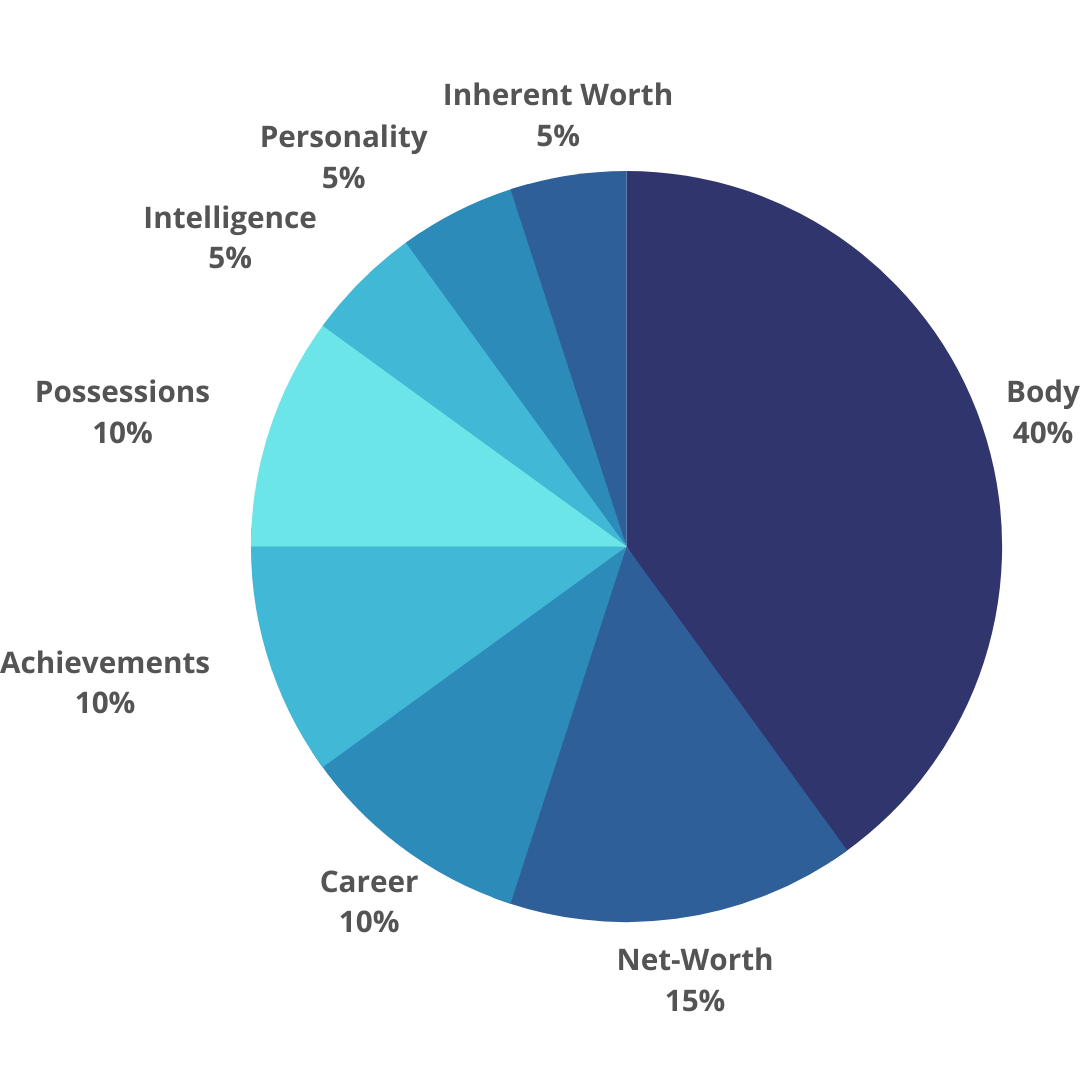
It’s understandable. Billions of dollars are spent on marketing to create problems out of nothing.
Cellulite? Problem. Wrinkle? Problem. Perfectly normal body feature? That’s going to be a problem now.
When you aren’t what others say is ideal and you see your body as a problem, your self-worth takes a hit along with your body image. You begin to see your body as a liability instead of an asset, and you wage a war against your appearance.
Remember… you have inherent worth as a human being. You don’t have to earn it.
You were born a valuable human being. It’s only through social conditioning that you strip away your inherent self-worth and start substituting it for body based worth.
4. Build Unconditional Confidence
We’ve all heard the marketing messages – “lose weight so you can be more confident!”
This kind of messaging also reinforces the idea that your body is your worth and that confidence is something you have to pursue and earn only after you’ve changed your body.
Why are we gatekeeping confidence? Why are we making confidence conditional on changing our bodies? Who decided this is going to be the way it is?
Look… if you want to be more confident – then BE more confident. True confidence doesn’t come from changing your body – it comes from owning who you are.
I know people will argue with the idea that losing weight doesn’t make you more confident. I was once one of those people too.
Here’s the thing – losing weight can absolutely improve your confidence. However, the kind of confidence you gain is what I call conditional confidence. And you’re better off without it.
With conditional confidence you’re only confident when you’re smaller or losing weight. That means any time you’re in a bigger body or your dieting efforts aren’t going to plan (which they rarely do go to plan), you experience a lack of confidence.
This conditional confidence is like a rollercoaster with ups and down for an entire lifetime.
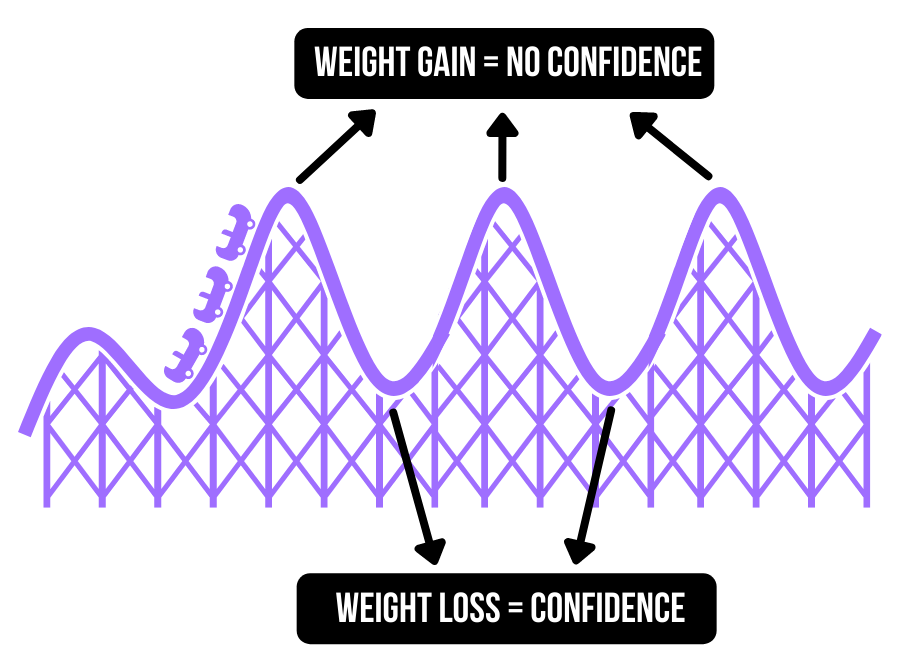
If you want to be confident, then BE confident. You don’t need permission. You don’t need to earn it. You don’t need to change your body to experience it.
There are people with amazing confidence in both big and small bodies. And there are people with horrible confidence in both big and small bodies.
True confidence isn’t body dependent. It is a choice – an identity you step into when you’re ready to embrace who you are and what you look like.
5. Ditch the Scale
One of the ways in which we tend to measure our self-worth is through the use of the scale. And since most people have their body image tied to their body, the scale ends up reinforcing their body image struggles.
To be fair to the scale, there’s nothing really good or bad about it. What makes it a liability is how it keeps us anchored to diet culture thinking, which inevitably leads to body image problems.
The relationship most people have with their scale is probably the most toxic relationship they didn’t realize they had.
How are you supposed to separate your worth from your body when you are holding onto a relationship that is keeping you anchored to that limiting belief?
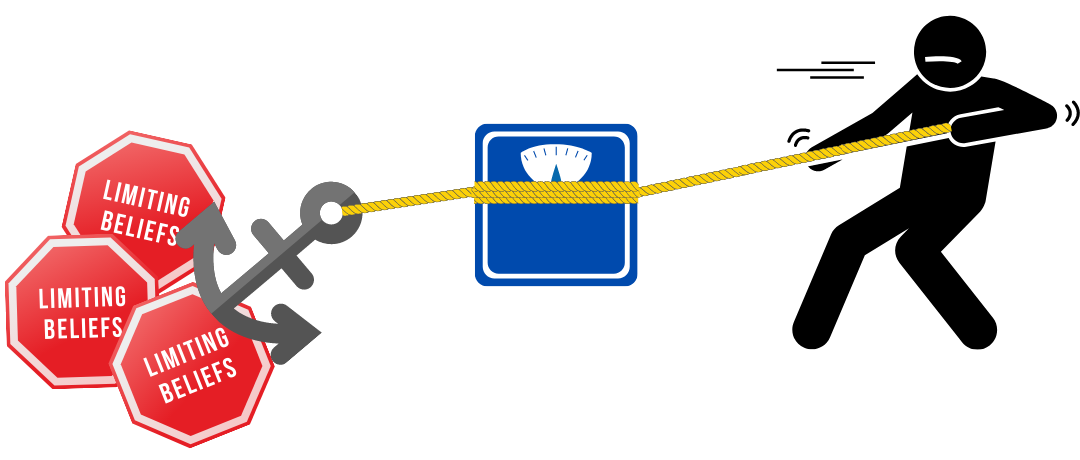
Look… I get it. It’s scary to break up with the scale.
How will you know if you’ve lost weight? Won’t you gain weight?
These fears are magnified because your body image is tied to your physical appearance. So any uncertainty or loss of control is a threat to your self-worth.
In reality, when you ditch the scale you end up turning inwards and eating and moving your body in a way that makes you feel your best. You stop eating for the scale and instead eat to meet your needs.
You can still track your progress, but replace the scale with a more useful measure of progress – the health of your relationships with food, body, exercise, and mind.
Your life experience will only improve if those relationships improve, which means your body image will only improve by you focusing on healing – not weight loss.
You can take a free assessment right here that will show you how healthy your relationships with food, body, exercise, and mind are, and how close you are to achieving your own unique ideal body.
6. Curate Your Environment
Our body image struggles are the result of all the different input we allow to be absorbed by our mind.
By input I mean all the different information we see, hear, and read from our environment.
These inputs from our environment create limiting beliefs surrounding our body and can lead to body image disorders, eating disorders, and disempowering thoughts that negatively impact our life experience.
Magazines, commercials, consumer products, books, TV, and even people, are all parts of your environment that produce inputs that influence your body image.
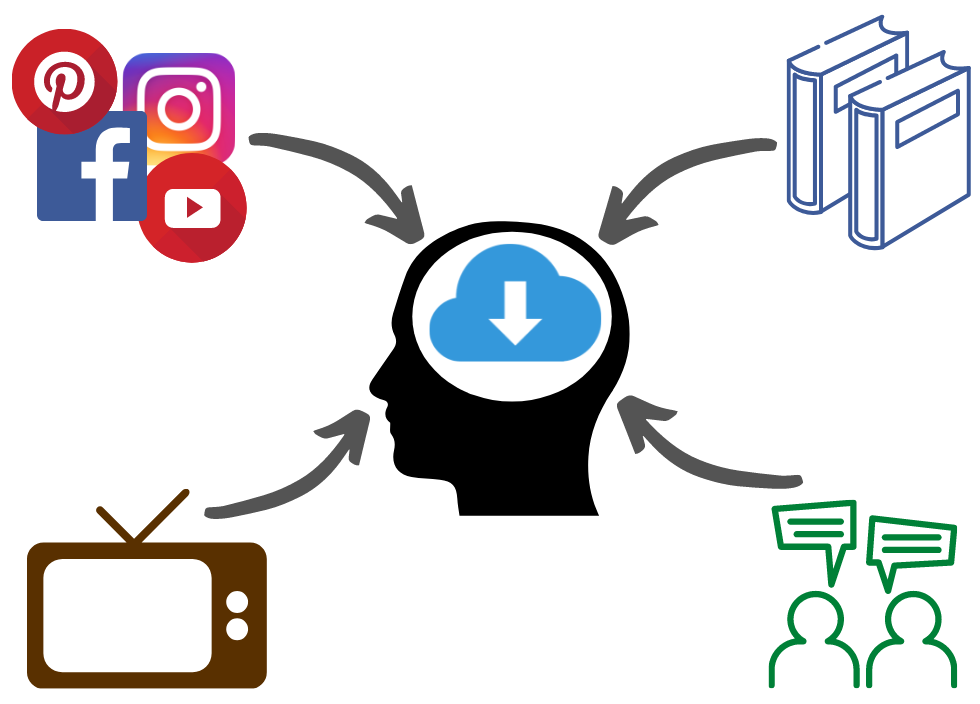
And then there’s social media to contend with.
With so many people posting only their highlight reels, and most photos being altered in an effort to match societal beauty standards, it’s easy to feel tricked into believing what’s real and what isn’t.
So if you want to improve your body image, you have to learn to curate your environment.
That means doing an audit of all your input to ensure that what you are allowing into your body, aka your mental diet, is up to standards.
If all you see are pictures of perfect bodies and it’s creating a negative body image, then it’s time for it to go. Unfollow social media accounts and be more meticulous about who you choose to follow.
If the people in your life are constantly talking about dieting, weight loss, and how much they hate their body, then you need to set a boundary with these people and raise your standards for what’s acceptable to you.
Be vigilant with your input.
7. Address Your Negative Self-Talk
If someone were to constantly tell you that you’re ugly, fat, unattractive, hideous, or any number of other negative terms, do you think that would help you create a positive body image? Or do you think it would create an unhealthy body image?
Common sense says the latter. If all you hear all your life is negativity towards your body, then it’s going to be hard to start perceiving yourself in a more positive way.
Well guess what? The number one offender of these negative body labels is rarely a friend, family member, co-worker, or even a stranger. Instead, we are our own worst offenders.
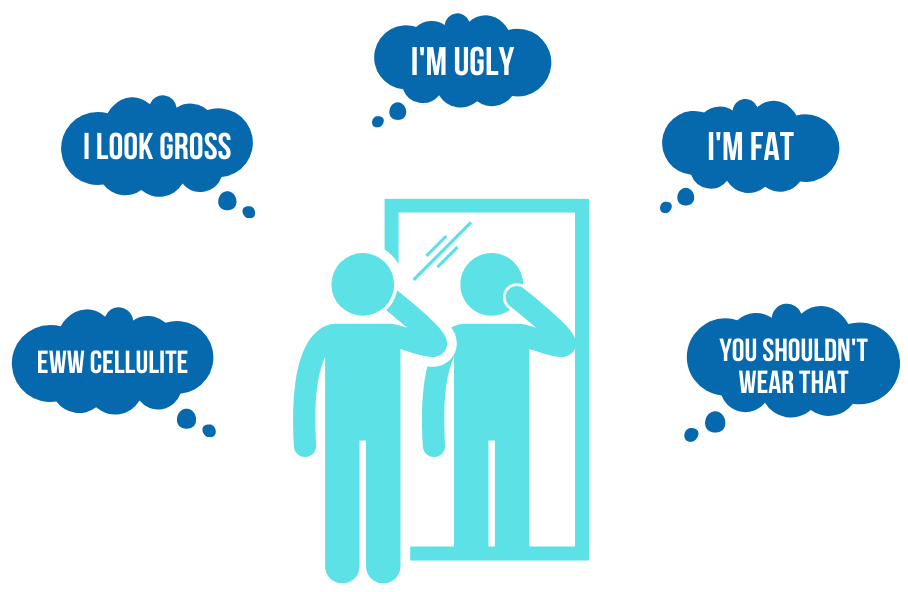
We are constantly barraging ourself with negative self-talk. We criticize our body parts. We shame our appearance. And we don’t even think twice about it.
Negative self-talk is a form of verbal abuse, and if you want to improve your body image, you’re going to have to stop criticizing yourself and start changing the words you use to describe yourself.
That voice in your head is there to keep you safe, but your body is not the threat your ego thinks it is.
Start becoming more aware of the words you say to yourself. When you say something negative about yourself, observe it and say “thanks, but no thanks.”
Your goals isn’t to necessarily turn negative self-talk into positive self-talk. Your goal is to neutralize the bad and challenge your limiting beliefs.
By doing this you will remove one of the biggest impediments to improving your body image.
8. Work On Body Acceptance
Body acceptance is a tough one for people. They don’t like what they see in the mirror, so the idea of accepting a body they hate is a difficult pill to swallow.
What most people don’t realize is that body acceptance is the path to a better body image. Improving your body image is so much easier when you are acting from a place of unconditional acceptance.
Acceptance is not giving up on yourself. It’s not burying your head in the sand. It’s just the opposite. It’s the first step to treating yourself better.
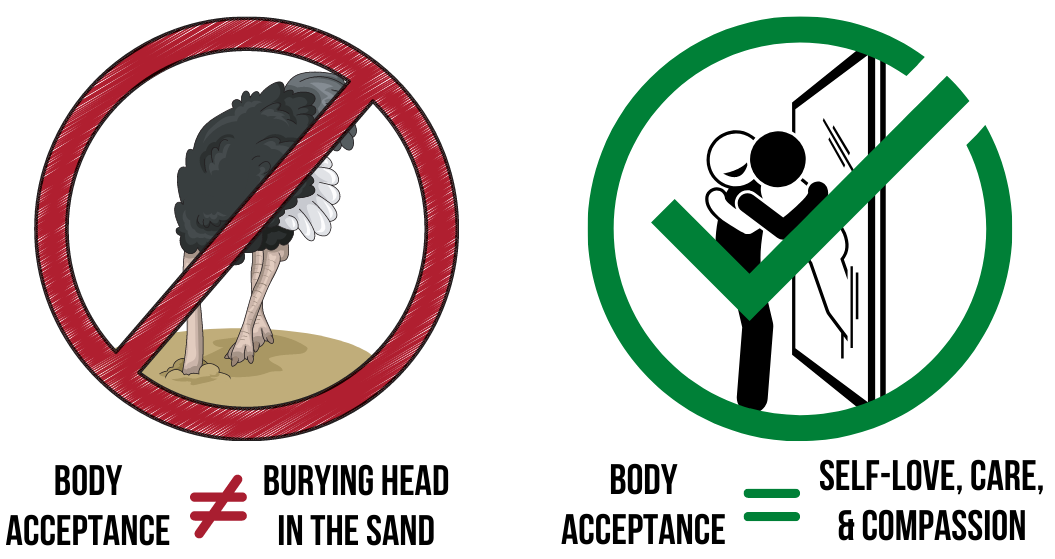
Think of it this way… we all have someone in our life that we don’t really like. Maybe it’s a bad neighbor or an annoying co-worker.
We tend to reject these people – trying our best to avoid contact and interaction with them. Do you think you treat these people the same as those you love?
Like most things in your life you hate and reject, you give those things or people very little of your attention. You don’t care for them. And you probably have very little compassion or understanding for why they are the way they are.
Well guess what? When you hate and reject your body, you treat yourself the same way.
You engage in behaviors that are actually hurtful in the long term, such as dieting, negative self-talk, and ignoring your basic human needs.
On the other hand, when you accept your body, you take care of it. Your behaviors come from a place of self-love, self-care, and compassion.
That’s why I say body acceptance isn’t giving up. It’s the first step to transformation and a necessary component of having a healthy body image.
9. Look Into the Mirror of Judgement
We tend to project our body image issues onto other people in the form of judgement.
When you look at someone, what do you see? Do you see a person as a whole human being? Or do you see people as the sum of their body parts?
Even if you do see people as whole human beings, do you ever judge their appearance?
Keep in mind that judgement doesn’t have to be some huge malicious attack. Sometimes judgement just comes in the form of noticing things.
However, whether you are judging the size of another person, or noticing the cellulite on their body, you aren’t actually judging that person – you’re judging yourself.
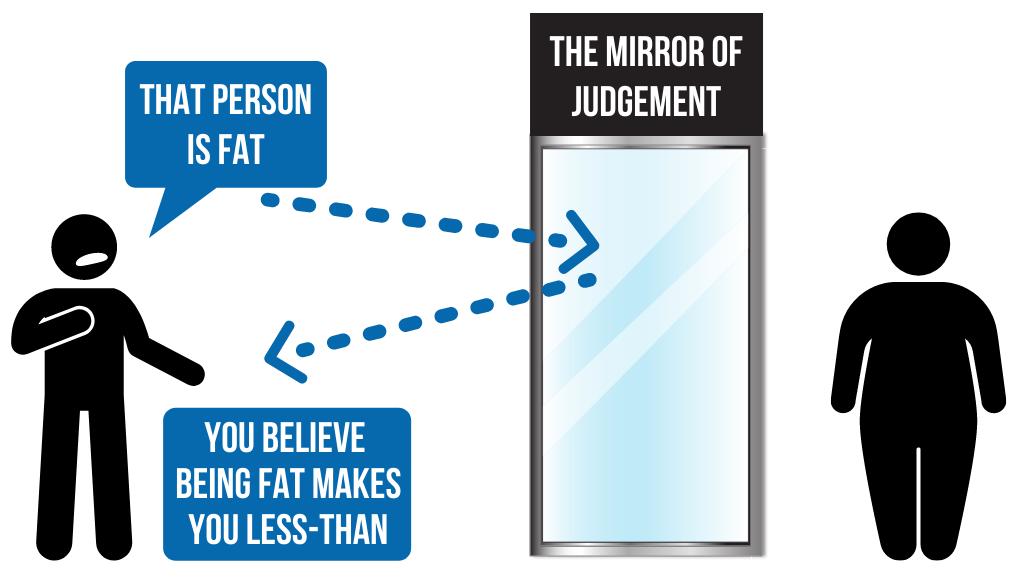
Other people are simply mirrors to our own thoughts and beliefs. When we notice something about someone else it’s because our own judgements are being reflected back at us.
If we are constantly noticing the size of other people or their physical appearance, then that means our own size and appearance is very important to us.
So when it comes to our body image, we can improve it by understanding that all judgement is self-judgement, and then by breaking those judgements we have about ourself.
Remember, body image is perception, and perception is the culmination of our thoughts and beliefs we have about ourselves.
By using the mirror of judgement and reflecting our judgements back to ourselves, we can neutralize the harmful beliefs we have about our body and improve our body image.
10. Close the Misery Gap
Most people are living in what you’d call the misery gap.
The misery gap is that space between your reality and your expectations. The further your reality is from your expectations, the bigger the gap, and the more miserable you are.
When what you look like doesn’t align with the expectations you have of your body, you create a misery gap, and this misery takes the form of a negative body image.
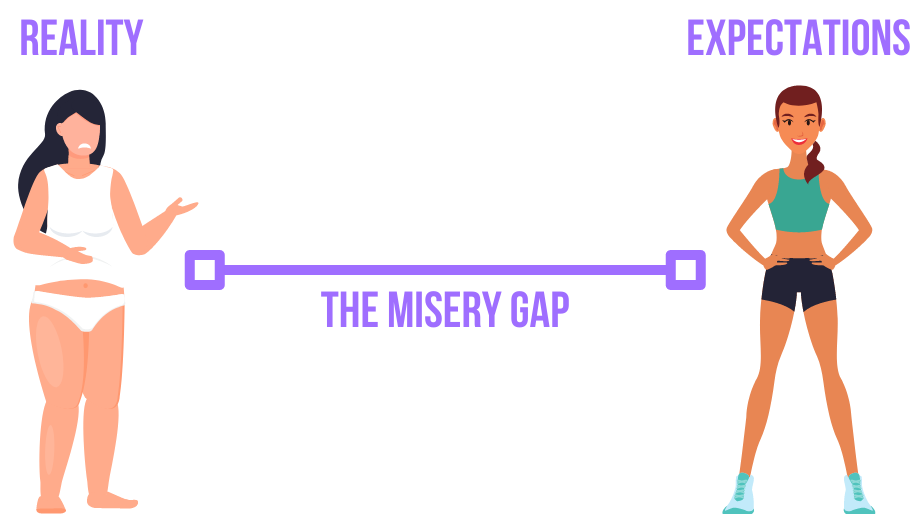
To improve your body image you have to close this gap. And to do this you focus on accepting your body unconditionally as it is right now, while also challenging unrealistic body expectations.
We already talked about body acceptance above, so let’s focus on body expectations for a minute.
Our body expectations are formed through our mental diet. If you remember, your mental diet is composed of all the informational inputs from your environment.
Social media, product marketing, magazines, diet books and programs, commercials, etc, all conspire to create body expectations that don’t match what you currently look like.
So to change your body expectations you have to be aware of this input and challenge the beliefs that are behind the messages.
Remember, you don’t have to adopt the beliefs of others.
Just because someone says you’d look better if you were smaller, it doesn’t mean that’s a judgement or belief you have to internalize. That belief is theirs, and it can be seen in their own mirror of judgement.
What Did You Think?
I’d like to hear your thoughts.
Was there a strategy or two that resonated with you more than others?
Which strategy will you use first to improve your body image?
Is there anything you can add that would help others?
Let me know your thoughts by leaving a comment below.
And if you enjoyed this article be sure to share it…

This was an excellent article! I really didn’t even think about social media but turns out I was following a lot of accounts that were probably hurting my body image. Went ahead and unfollowed a good amount of them. Thanks!
Glad you liked it, Julie 🙂
I still find myself unfollowing accounts as time goes on. Really just depends on what “season” of life I’m in. Sometimes someone’s content can be triggering. Other times it doesn’t bother me. So I’m constantly assessing my input.
Great read. Ty!
I like your definition of the ideal body better. It’s actually reasonable. Most people will never look like the people they are trying to imitate anyways. That is THEIR body not yours.
Yes exactly. Your Ideal Body should be unique to you – not molded in someone else’s image. The body that is ideal for you is the one that leads to you being happy, healthy, and confident. That may or may not look the way you think. But it doesn’t matter because you’ll be living life your full life experience.
Ok I took that assessment and I got a 42. Is that good or bad? I’m not sure what to make of it
For those wondering, Kristin is talking about the Ideal Body Assessment I linked to in the article. It’s what we use for new clients to assess the health of their relationships with food, body, exercise, and mind. You can take it here – https://builtdaily.com/assessment/
Now, I wouldn’t think of 42 as either good or bad – it just is. That’s where you are right now. Many people who start our programs have both lower or higher numbers. Your goal is to heal your relationships and start improving that number. The closer it gets to 100, the closer you are to your unique Ideal Body, which means you are getting closer to living your full life experience.
ughh I really hate the scale but i’m afraid to give it up… it does seem like it keeps me in check… but you’re right that i’m still struggling so maybe it doesn’t help
Hey Pam, most people like to give credit to the scale for when they lose weight, and then blame the lack of the scale for them gaining weight. In reality, the reason they stop weighing themselves is because using the scale created restrictive Diet Culture behaviors that eventually lead to inconsistent eating. Once eating got inconsistent, weight started being regained, and they stopped weighing themselves because they didn’t want to see that number anymore. That entire scenario is because the scale was being used before that person had healed.
When you ditch the scale this time you’ll be going into the process with a much different mindset. You are choosing to give it up because you want to heal, as opposed to not using it because you were feeling out of control.
Love this! After weighing myself daily for 4 years (!), I gave up the scale 2 weeks ago. I admit to having misgivings at the time, but decided I had to start to heal my relationship with my body and self image. So far so good: I feel good, haven’t gone wacky with food in either direction, my clothes fit the same and I’m really enjoying NOT getting on the scale. What a way to start the day! My whole attitude to myself is improving. Win-Win!
That’s awesome! In my experience it gets easier to live without it as time goes on. For a lot of people it gets to an inflection point where it’s harder to get ON the scale than it is to stay OFF it. Glad it’s working out for you 🙂
Any advice on HOW to work on body acceptance? I get that it’s important but it’s hard to accept a body I don’t like.
It’s definitely a process. Probably more than I can lay out in a comment. Check out our podcast, Fitness and Sushi on Apple podcasts or Spotify (or wherever you listen to podcasts). Find an episode that has to do with improving your body image.
Body acceptance doesn’t work in isolation. It’s equal parts learning how to handle judgement, dealing with negative self-talk, redefining your self-worth, and reconnecting with your body. Each of these things (and more) have their own processes for improvement.